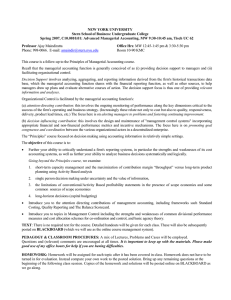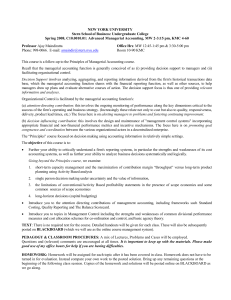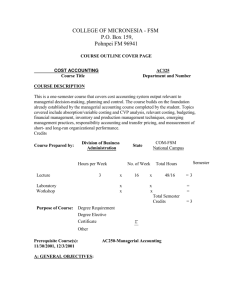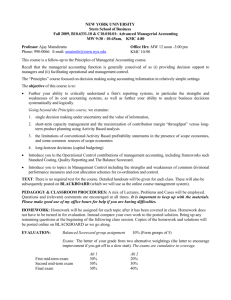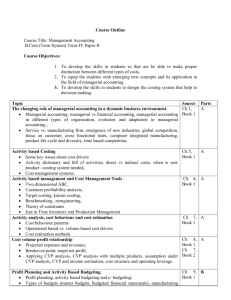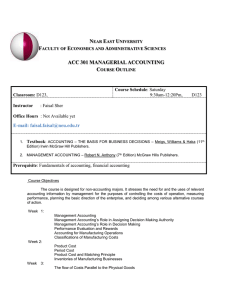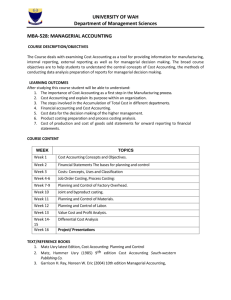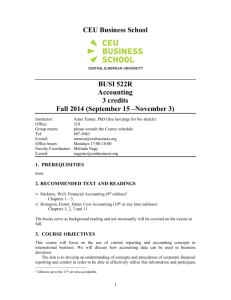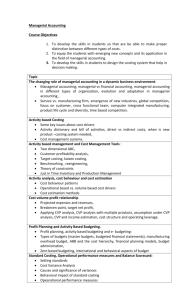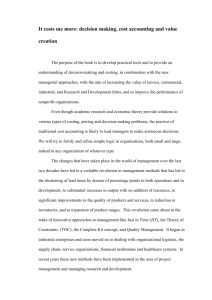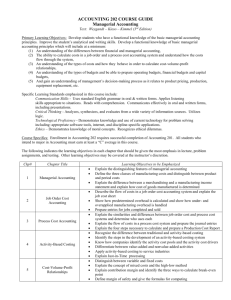Syllabus Strategic Managerial Accounting_F2015 - CEU E
advertisement
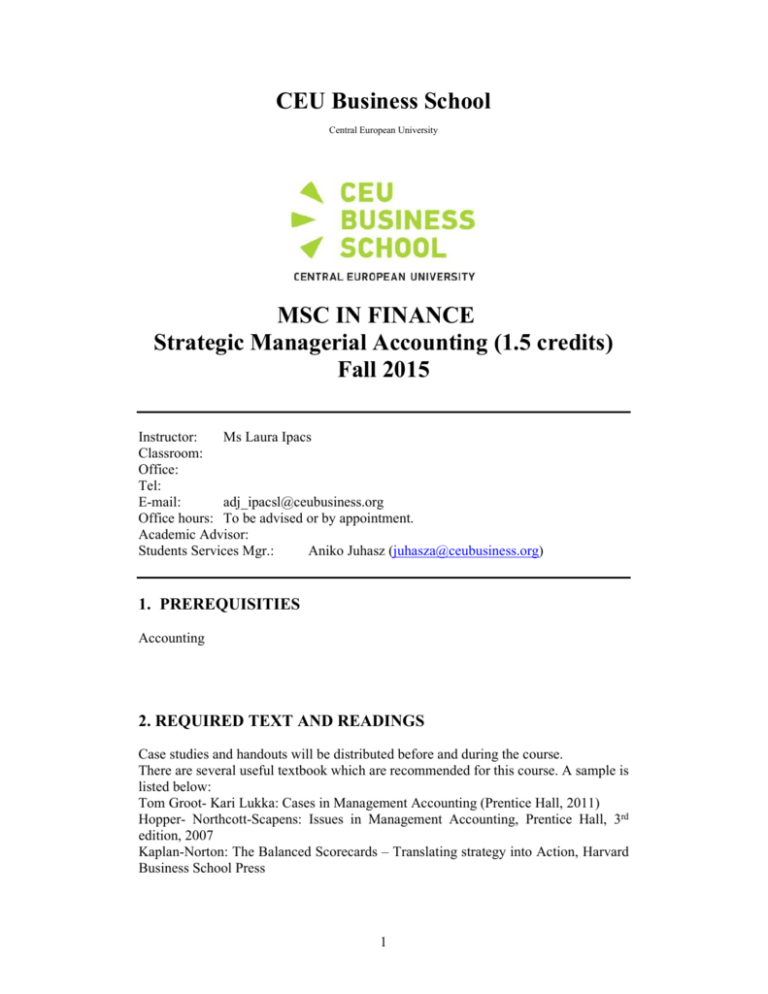
CEU Business School Central European University MSC IN FINANCE Strategic Managerial Accounting (1.5 credits) Fall 2015 Instructor: Ms Laura Ipacs Classroom: Office: Tel: E-mail: adj_ipacsl@ceubusiness.org Office hours: To be advised or by appointment. Academic Advisor: Students Services Mgr.: Aniko Juhasz (juhasza@ceubusiness.org) 1. PREREQUISITIES Accounting 2. REQUIRED TEXT AND READINGS Case studies and handouts will be distributed before and during the course. There are several useful textbook which are recommended for this course. A sample is listed below: Tom Groot- Kari Lukka: Cases in Management Accounting (Prentice Hall, 2011) Hopper- Northcott-Scapens: Issues in Management Accounting, Prentice Hall, 3rd edition, 2007 Kaplan-Norton: The Balanced Scorecards – Translating strategy into Action, Harvard Business School Press 1 Kaplan-Atkinson: Advanced Management Accounting, Prentice Hall, 5th edition onwards Hoque: Strategic Management Accounting, Pearson, 2nd edition, 2003 3. COURSE DESCRIPTION AND OBJECTIVES It is vital for corporations to remain competitive in today’s dynamic operating environment. In this course, we will present and analyse a framework for creating a value-based performance management system. The techniques, methodologies, theories and practices behind organisational and customer value creation will be presented in an analytical and critical manner. The main aims of the course are to raise participants’ awareness to the best practices and latest developments in performance management accounting and to illustrate reallife uses of the changing nature of accountancy in the organisation. Participants will be provided with an understanding of the strengths and limitations of accounting for performance, considering the behavioral and ethical aspects of management systems. 4. MAIN TOPICS • • • • • • • • The inadequacy of ‘profit’ as the only performance measure - the changing business landscape in the 21st century Customers, suppliers and key stakeholders - The need for strategic management information and its uses Specialist cost and management accounting techniques Decision-making: what influences it? What aspects to consider? The influencers on pricing decisions and target costing Better budgeting and the meaning of variances to budget Setting organizational goals and evaluating performance The balanced scorecard and other measures of performance 5. INTENDED LEARNING OUTCOMES Financial decision – making encompasses all aspects of an enterprise. Students will learn how to incorporate differing and sometimes contradicting points of view into financial decision-making and will appreciate the usefulness and also the limitations of focusing on the financial aspects of particular situations. Students will be given the tools of financial analysis and decision-making, but will be expected to use these while taking personal responsibility for decisions. They will be expected to make informed choices and defend their own personal stances when making decisions. Managerial accounting is fundamental to proper business operations and management information system constitute the basis of managerial decision-making. Students will 2 be expected the understand the usefulness and characteristics of such information systems and will learn how to contribute to system design and operation. Such systems are driven by the strategic needs or organisations and students will learn how to incorporate strategic goals and design performance measures. 6. ACADEMIC INTEGRITY The Business School expects all students to adhere to the fundamental principles of academic integrity in all behavior associated with their course work, as stated in the CEU Honor Code (see Student Handbook). Cheating on the final exam or minute papers will not be tolerated in this class, and will be punished to the maximum extent permitted under CEU rules. 7. COURSE OUTLINE AND SESSION ASSIGNMENTS S1 What is strategic management information The changing business landscape in the 21st century The need for strategic management information and its uses Divisional performance and transfer pricing Beyond the numbers: managing for value and strategic alignment S2 Decision – making and value creation Activity-based costing and throughput accounting Customer profitability analysis and customer accounting The Value Chain and its implications for organisational effectiveness Lifecycle costing and customer profitability Target costing: decisions and considerations S3 Managing for value in organisations Motivation and congruence Choosing and using a mix of performance measures Employee empowerment Analysing performance in organizations: variances and their use and limitations S4 Economic and shareholder value added and The balanced scorecard. Performance management for the future The issues with traditional financial measures of performance 3 Vision, mission and the strategy map Value propositions Creating scorecard measures : the finance input S5 Using budgets for stategic advantage Budgeting types and current practices: incremental, zero-based and rolling budgets Behavioural implications of budgets and goal incongruence Is there an alternative? Beyond budgeting S6 Current issues, summary and final test FINAL EXAM 8. GRADING AND ASSESSMENT The assessment for the course comprises of 3 parts, with their respective weights detailed below: 25% class attendance, seminar preparation, problem solving and class participation 35% assignment preparation 40% final exam Grading is based on the total score in line with standard grading patterns at CEU. Homework will be divided between respective student groups where you will be expected to discuss and address the questions prior to each class session. Students present their discussions/findings/calculations during the seminar sessions. Each group member should stand ready to present where they will be randomly called upon to do so. Adequate class participation is required for passing the class. You will be called upon to participate or contribute to classwork discussions if your participation score has been inadequate (or non-existent). 4
